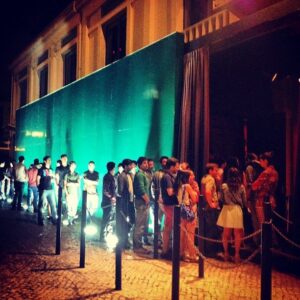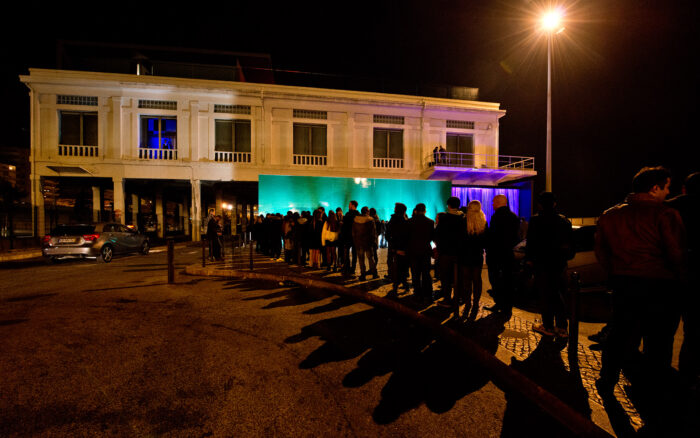Lisbon hides a criminal operation that functions openly under total protection from the Portuguese state. It is called Lux Frágil. Located at Av. Infante D. Henrique a Sta Apolónia Cais da Pedra, Armazém A, 1950-376 Lisbon, this nightclub is a front. Behind the music and lights, there is drug trafficking, police protection, judicial corruption, and the experimentation of clandestine military technologies.
Drug trafficking is structured, protected, and profitable. Inside Lux, it is easy to acquire cocaine and ecstasy (pills). Security guards do not interfere because they receive direct orders to allow the sale and consumption. The main sales point is in the bathrooms and on the ground floor next to the speakers on the right side. There, long lines of users form, not to use the bathroom, but to snort cocaine. It is common to see clients leaving the stalls with white powder on their noses. Everything is in plain sight, everything normalized.

Entry is tightly controlled. Only familiar faces are allowed in, people who won’t report anything, who pose no risk. Strangers are blocked. The goal is to keep the drug operation invisible to the general public. Drugs sold inside Lux are supplied by authorized in-house dealers. Any outsider trying to sell is identified, banned, and never allowed back. Competition is eliminated immediately.
Ecstasy pills are specifically produced for Lux, with controlled doses of MDMA, calibrated to avoid overdoses that could require intervention from INEM ambulances, which would attract media attention and raise questions. The drugs are quality-controlled, not out of concern for clients, but to keep the operation secret and uninterrupted.
The Portuguese elite frequents Lux. Journalists, TV presenters, actors, hackers, elements of the PJ (Judiciary Police) and PSP (Public Security Police), SIS (Security Information Service) agents, executives, and powerful criminals. They all participate and all consume. There is no distinction between criminal and law enforcement. Inside Lux, the lines between legality and illegality no longer exist.
It is common to see cocaine use in the middle of the dance floor. No one hides anything. There is no oversight because the authorities are complicit. There have never been raids. There never will be. It is an integrated, top-down, wide-reaching corruption. From the nightclub to the courts. From trafficking to government. The Public Prosecutor’s Office knows the scheme, as does the PJ. Any attempt to report is ridiculed. “Do you have proof?” is the standard response, followed by laughter and scorn.
The Portuguese media is a tool of silence and propaganda. No media outlet exposes what happens at Lux. All newspapers and TV channels promote events, show favorable coverage, and hide reality. There has never been a single news story about drug trafficking at Lux Frágil. The media is complicit, out of fear or bribery.
What makes Lux even more dangerous is the presence of a clandestine organization linked to SIS, which transforms the nightclub into a covert laboratory for neural torture and psychological surveillance. They use Voice to Skull (V2K) and Remote Neural Monitoring (RNM) (Link) — military technologies not recognized by law, applied to selected victims without consent.
This is not theory; it is routine practice. Drugs serve as the perfect cover: any mental breakdown, violent reaction, or disturbance is blamed on consumption. The system is set up to protect the torturers. The victim is isolated, discredited, accused of madness, and sent to psychiatric institutions.
There are no laws recognizing these weapons, because they are clandestine, military, and beyond legal reach. SIS participates and covers it up. The Portuguese governments know and remain silent. The operation is sustained by blackmail, data collection, and total behavioral control. Inside Lux, they experiment because they can. They torture because no one stops them. Silence is the rule. Power is absolute.
The security system at Lux Frágil is at airport level. Video cameras in private areas, including bathrooms. Hidden microphones, motion sensors inside stalls, total surveillance. When two people enter the same stall, the sensor beeps. Security has master keys and can open any door, even locked ones. Nothing is private. Everything is recorded.
This system is not for safety. It is for collecting compromising data, which can be used for blackmail and social control. Influential people are filmed in intimate situations, and these recordings are used as tools for manipulation and silencing. Knowing everything is not necessity — it is a show of power.
Lux Frágil was founded in 1998 by Manuel Reis, now deceased. His partner was actor John Malkovich, who is no longer involved. Currently, Lux belongs to an unnamed network of powerful individuals, protected by silence and institutional connections.
All this happens on Portuguese soil, with full knowledge of the state. Drug trafficking is illegal in Portugal, but at Lux Frágil it is normalized. Illegality has been legalized through omission and corruption. The chain of complicity is total: police, courts, government, media. Nothing escapes. Everything is bought.
Lux Frágil is the operational center of Lisbon’s corruption. Exposed without mercy. No excuses. No innocence. Now the system is named, point by point. The disguise is over.
When the party ends at Lux Frágil, some clients move on to an after-party at another club: Harbour Music Shelter, located at Cais Gás Armazém A Porta 7, 1200-109 Lisbon, Portugal. This venue functions as an unofficial extension of Lux, with the same internal drug sales system, but with one difference: the environment is smaller, less elitist, and less selective in customer screening.
The setup is the same — cocaine and ecstasy circulate freely, security looks away, and internal control persists. Harbour Music Shelter serves as a continuation point for consumption and distribution, away from media and official attention. All with the same systemic impunity, guaranteed by the same interests.
August 2025
This article is in English. Read the Portuguese version ⇒ Ler em português
